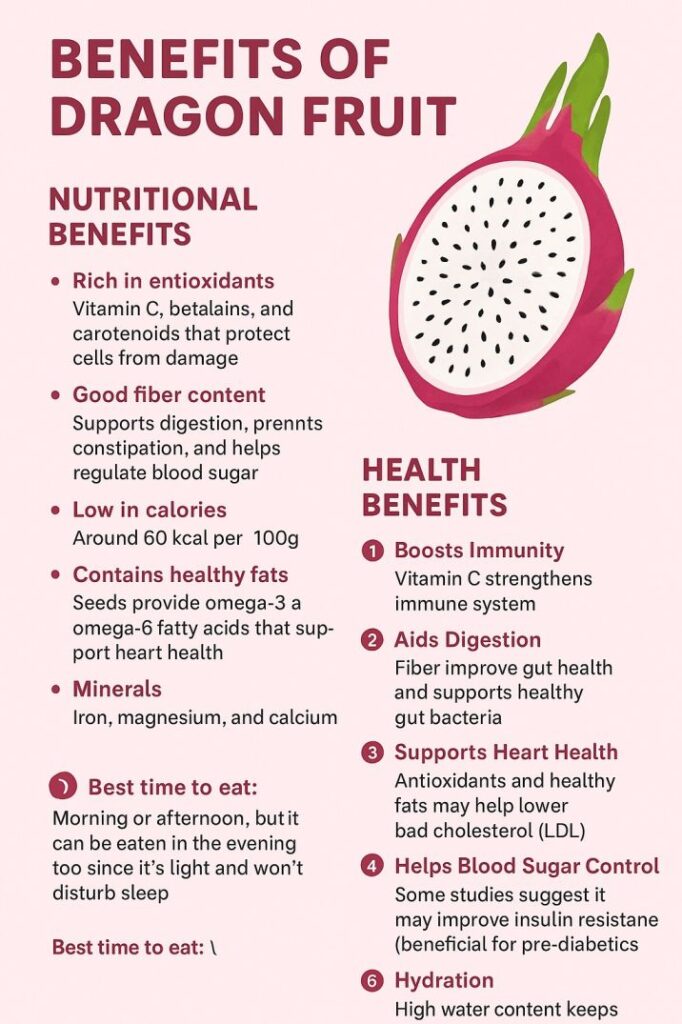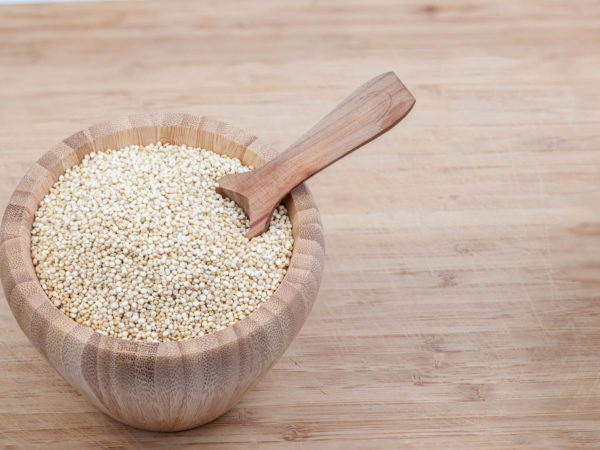Introduction
Dragon fruit (Hylocereus undatus), scientifically known as pitaya or pitahaya, is a tropical cactus fruit that has garnered significant attention in nutritional research and clinical practice. Native to Central America and cultivated across tropical regions, this exotic fruit is distinguished by its vibrant magenta exterior, translucent flesh with edible black seeds, and impressive nutritional profile that positions it as a functional food with therapeutic potential.
Nutritional Composition
Dragon fruit demonstrates a favorable macronutrient and micronutrient distribution, making it an excellent addition to health-conscious dietary patterns. Per 100-gram serving, the fruit provides:
Macronutrients:
- Energy: 60 kilocalories
- Carbohydrates: 13 grams
- Dietary fiber: 3 grams
- Protein: 1.2 grams
- Total fat: 0.4 grams
Micronutrients:
- Vitamin C: 20.5 mg (34% Daily Value)
- Iron: 1.9 mg
- Calcium: 8.5 mg
- Magnesium: 18 mg
- Phosphorus: 22.5 mg
The seeds contain beneficial polyunsaturated fatty acids, including omega-3 and omega-6 essential fatty acids, contributing to the fruit’s overall nutritional value.
Evidence-Based Health Benefits
Immune System Enhancement
Dragon fruit’s high vitamin C content and diverse antioxidant compounds, including betalains, phenolic acids, and flavonoids, contribute to enhanced immune function. These bioactive compounds help neutralize reactive oxygen species and support the body’s natural defense mechanisms against pathogens and oxidative stress.
Gastrointestinal Health Support
The substantial fiber content in dragon fruit promotes optimal digestive health through multiple mechanisms. The prebiotic properties of its fiber support beneficial gut microbiota growth, while the bulk-forming properties facilitate regular bowel movements and may reduce the risk of constipation and other gastrointestinal disorders.
Cardiovascular Health Benefits
Research suggests that dragon fruit consumption may contribute to cardiovascular health through several pathways. The fruit’s antioxidant profile helps reduce oxidative stress on blood vessels, while the omega fatty acids from the seeds may support favorable lipid profiles. Additionally, the potassium content contributes to blood pressure regulation.
Glycemic Control Properties
Preliminary studies indicate that dragon fruit may have beneficial effects on glucose metabolism. The fruit’s low glycemic index and fiber content may help moderate postprandial blood glucose responses, making it a suitable option for individuals managing diabetes or prediabetic conditions under medical supervision.
Dermatological Benefits
The combination of vitamin C, antioxidants, and hydrating properties in dragon fruit may support skin health. Vitamin C plays a crucial role in collagen synthesis, while antioxidants help protect against UV-induced oxidative damage and premature aging.
Hydration and Mineral Balance
With approximately 90% water content, dragon fruit serves as an effective hydrating food that also provides essential minerals. This makes it particularly valuable for maintaining fluid balance and supporting overall physiological functions.
Hematological Support
The iron content in dragon fruit, while modest, contributes to hemoglobin synthesis and oxygen transport capacity. This may be particularly beneficial for individuals at risk of iron deficiency, though it should not be considered a primary iron source.

Clinical Considerations and Optimal Consumption
Dragon fruit is generally well-tolerated and can be consumed at various times throughout the day due to its gentle nature and high digestibility. The fruit’s low caloric density and high water content make it suitable for weight management protocols.
For optimal nutritional benefit, consumption during morning or midday hours may enhance nutrient absorption and energy utilization. The fruit’s mild flavor profile and refreshing texture make it versatile for incorporation into various dietary applications.
Conclusion
Dragon fruit represents a scientifically supported functional food that offers multiple health benefits while maintaining excellent palatability and nutritional density. Its comprehensive micronutrient profile, combined with bioactive compounds and favorable macronutrient distribution, supports its classification as a valuable addition to evidence-based nutritional interventions. Healthcare practitioners and nutrition professionals should consider recommending dragon fruit as part of a diverse, plant-forward dietary pattern for individuals seeking to optimize their nutritional intake and support overall health outcomes.
Note: While dragon fruit offers numerous health benefits, individuals with specific medical conditions should consult with healthcare providers before making significant dietary modifications.


